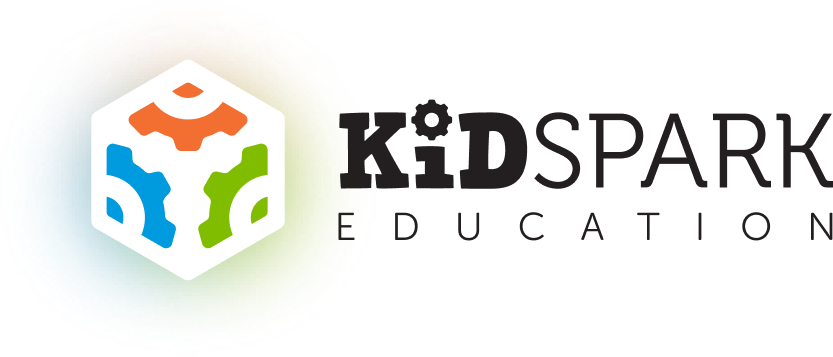History of Research & Development
Since 2009, Kid Spark has collaborated with educators and researchers at leading universities to guide the development of our educational programs. This formative work provided key insights into the importance of starting hands-on STEM instruction early and innovative ways to support educators as STEM mentors.

PROJECT/INITIATIVE:
University of California-San Diego (UCSD) Center for Academic and Social Advancement (CASA) Pilot Study “Building Minds: Identifying the Building Blocks of Imaginative Play”.
UCSD/CASA Final Report “Designing Curriculum and Building Minds: Developing Readiness for Science-Related Skills and Dispositions”.
Kid Spark establishes partnership with Pittsburg State University (Kansas) Department of Technology & Engineering Education.
Kid Spark Education becomes a 501c3 non-profit.
USD Design-Research Study “Learning How to Think Like an Engineer: A Design-Based Research Study of Kid Spark Education’s Curriculum in Kindergarten”.
NP Strategies “Student and Partnership Experience Evaluation”.
USD and San Diego Foundation “Research on how to start and sustain elementary STEM and Invention Education Programs serving underrepresented children”.
Fostering 21st Century Literacy through the Convergence of Reading and Invention
Key Findings: Underserved children may be missing foundational STEM fluencies that allow them to relate to science and engineering. Additionally, the role of a mentor is essential in helping children go beyond their learning edge.
Key Findings: Mentored guidance led to children displaying more creativity in unguided free-play or invention opportunities.
Key Developments: Initial design of early childhood curriculum focused on mentors helping young children learn foundational STEM fluencies.
Key Developments: Mobile STEM Labs, Convergent to Divergent Lesson Plans
Mission: To help all children, especially those from underserved and underrepresented communities, to learn an love STEM.
Key Developments: Revised early childhood curriculum for grades Pre-K - 1st helps children develop important fluencies that are prerequisite for all STEM learning.
Key Findings: Children report a dramatic increase in how much they like or love STEM after engaging in a Kid Spark Program. Educators report significant increases in their own comfort with teaching STEM.
Key Findings: Successful STEM education relies on collaboration, hands-on learning opportunities, accountability through mentorship to support professional growth, strong leadership, dedicated time for STEM, and adaptable resources to meet diverse student needs.
Anticipated Findings:: Integrating STEM education with literature fosters children's inventive mindsets and problem-solving abilities, strengthens their STEM identities, enhances their comprehension and engagement with reading, and boosts educators' confidence in teaching STEM concepts through familiar mediums like reading.



Key takeaways from our history of research include:
-
All Children Need to Acquire Foundational STEM Fluencies
Foundational STEM fluencies, such as spatial reasoning and creative problem-solving, are essential for all students. While some may develop these skills at home, many underserved children lack them, impacting their confidence in STEM subjects upon entering school.
-
Early and Continuous STEM Engagement is Essential
Research indicates a concerning trend: by 4th grade, one in three children has already disengaged from STEM, increasing to one in two by 8th grade. To ensure success in a technology-driven era, children need early and consistent exposure to STEM education, fostering a lifelong passion for the subject.
-
STEM Mentors Matter
Mentors play a crucial role in guiding children through STEM learning beyond their individual capabilities. While free play with STEM materials has value, mentors facilitate deeper exploration, helping children learn new concepts and apply their knowledge in creative ways.
-
Hands-On Engineering: A Strategic Gateway
Active engagement in hands-on engineering and invention education is vital for children to understand STEM disciplines and develop a strong STEM identity. Through tangible projects, children learn to embrace trial and error, fostering a growth mindset towards STEM.
-
Effectiveness of Kid Spark STEM Programs
Kid Spark Programs maximize existing resources, utilizing current staff, classroom facilities, and reusable engineering materials. Our flexible curriculum covers various STEM topics, catering to individual student needs. Participants typically exhibit a significant increase in their enjoyment of STEM activities, while educators report enhanced confidence in teaching complex subjects like physics and engineering.
-
Essential Elements of Effective STEM Professional Learning
Community of Practice Building: Promotes collaborative learning among educators, fostering knowledge sharing and skill improvement.
Experiential Learning Opportunities: Hands-on experiences enhance educators' confidence and comprehension of STEM concepts.
Accountability through Mentorship: Providing guidance and feedback ensures educators stay on track with their professional development.
-
Key Factors for Sustaining Long-Term STEM Learning
Leadership Support: Strong administrative backing is crucial, with STEM integration mandated in the curriculum.
Allocated Time for STEM: Allotting dedicated time within the school schedule is essential for successful STEM implementation.
Designated STEM Coordinator: Having an on-site coordinator with expertise in STEM initiatives is vital for seamless program execution across classrooms.
Professional Development Fostering Community of Practice: Educators and administrators require hands-on training and collaborative learning opportunities to effectively implement STEM standards.
Flexible Curriculum Adaptation: Curricula must be adaptable to meet diverse student needs and educational contexts, with Kid Spark being highly praised for its flexibility and ease of adaptation.
Research Reports & White Papers



Developing a STEM Identity as an Educator:
A Design-Based Research Study of Kid Spark Education’s STEM Professional Learning Program



Exploring Student and Partner Experiences:
Insights for Kid Spark Education Program Development and Partnership Enhancement



Learning How to Think Like an Engineer:
A Design-Based Research Study of Kid Spark Education’s Curriculum in Kindergarten



Designing Curriculum and Building Minds:
Developing Readiness for Science-Related Skills and Dispositions



Building Minds:
Identifying the Building Blocks of Imaginative Play
Academic Partners

Pittsburg State University

University of San Diego

University of California San Diego
Support on-going STEM Equity Research
If you are interested in supporting our current research projects, or have an idea for research that will make STEM education accessible to underserved children, we would love to hear from you!
